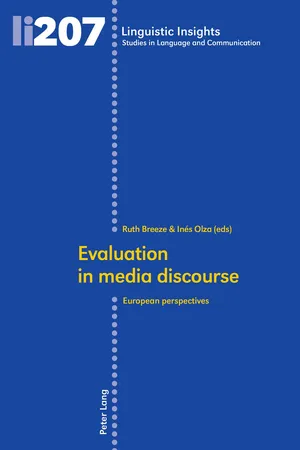
- 286 pages
- English
- PDF
- Available on iOS & Android
About this book
Despite the apparent novelty and fluidity of the media today, there is strong evidence that patterns are emerging which both reflect and extend the evaluative paradigms previously observed in the print and broadcast media. In this complex scenario, discourse analysis offers a rich and varied methodology for understanding the different types of evaluation conveyed through media texts and the way these project, reflect and develop their relationships with their audience. The chapters in this volume draw on a variety of analytical tools, including appraisal analysis, argumentation theory, multimodal approaches and corpus linguistics, to address the issue of evaluation in media discourse. The theoretical underpinning for these chapters ranges from corpus-informed discourse studies, through critical discourse analysis and semio-communicative approaches, to Bakhtinian perspectives. Although the chapters are all in English, the scope of the volume is broadly European, covering aspects of the British, Spanish, Dutch and German media in their traditional and online manifestations, as well as contrastive studies.
Frequently asked questions
- Essential is ideal for learners and professionals who enjoy exploring a wide range of subjects. Access the Essential Library with 800,000+ trusted titles and best-sellers across business, personal growth, and the humanities. Includes unlimited reading time and Standard Read Aloud voice.
- Complete: Perfect for advanced learners and researchers needing full, unrestricted access. Unlock 1.4M+ books across hundreds of subjects, including academic and specialized titles. The Complete Plan also includes advanced features like Premium Read Aloud and Research Assistant.
Please note we cannot support devices running on iOS 13 and Android 7 or earlier. Learn more about using the app.
Information
Table of contents
- Cover
- Contents
- Foreword
- Introduction (Ruth Breeze / Inés Olza)
- Stancetaking and inter/subjectivity in journalistic discourse: The Engagement system revisited (Juana I. Marín-Arrese)
- Concession in evaluative argumentative discourse: The semantics, pragmatics and discourse functions of but and although (María de los Ángeles Gómez González)
- Evaluation in the headlines of tabloids and broadsheets: A comparative study (Laura Alba-Juez)
- Negotiating futures in socio-technical controversies in the media: strategies of opinion orientation (Paola Catenaccio)
- The banality of evil. A study about translating “los desaparecidos” in the German and English press (Frank J. Harslem)
- “A life well lived of a lady well loved”: The power of appraisal in the comments section (Isabel Corona)
- The evaluative potential of colonial metaphor scenarios in (written) media representations of Spain’s economic expansion. Spanish investors as forceful aggressors or audacious pioneers? (Jasper Vandenberghe)
- Re-articulating critical awareness about racism in public discourse: Changing one’s mind on the Black Pete debates in the Netherlands (Jan Zienkowski)
- Notes on Contributors